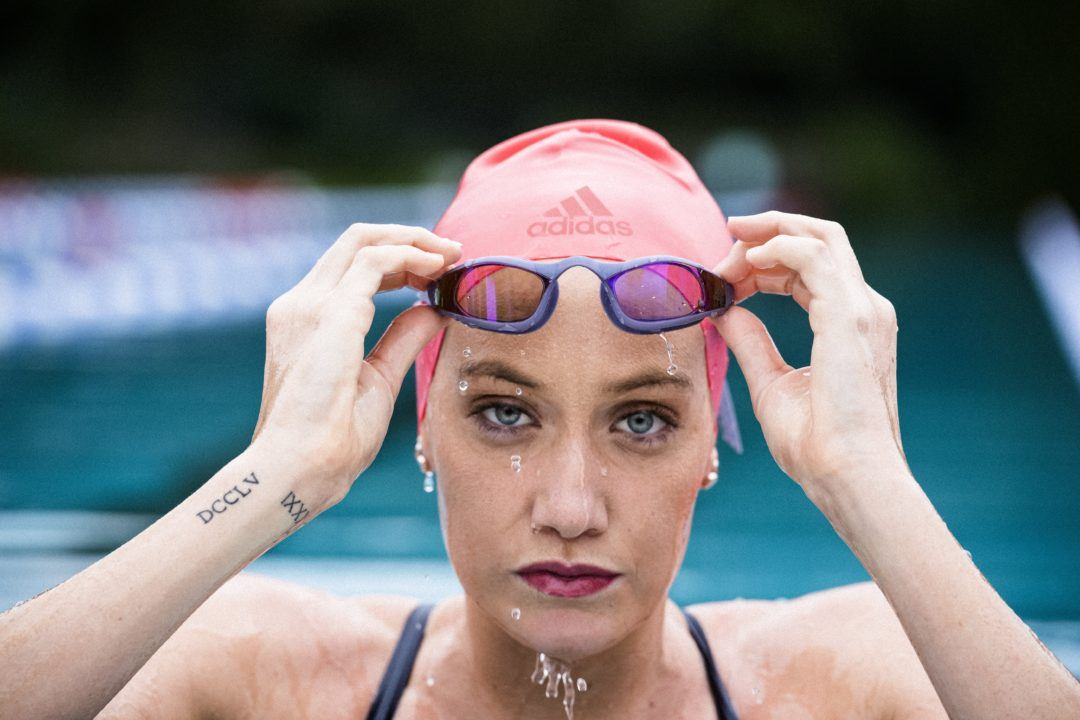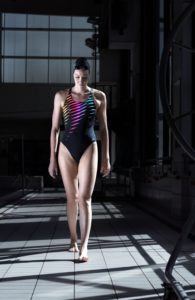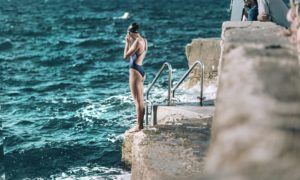If there’s one word to describe Australian swimmer Madison Wilson, it’s “positive.” We caught up with Wilson after this year’s World Championships. As we chatted, it was evident that, despite having a summer that was a little different for her, personally, and where the Australians collectively were not as strong as we’ve gotten use to seeing them, Wilson, who’s known for her volunteerism as well as her swimming prowess, exudes positivity.
Wilson won medals in all three backstroke events at the 2013 World University Games in Kazan, and she also swam backstroke in the prelims for Australia’s medal-winning medley relays at the 2015 World Championships and 2016 Olympic Games, where she also made finals in the 100 back. However, this year she made Australia’s squad only as a member of their free relay teams, where she earned a silver medal for the 4×100 free and a bronze medal for the 4×200 free.
Reflecting on not getting to swim backstroke at World Championships, Wilson said, “It was definitely different for me. I think it didn’t hit me that I wasn’t swimming backstroke at the major meets this year until I was actually there. We’ve been in Europe now for a fair few months to do all the Mare Nostrum series and obviously I was able to swim backstroke there, so it kind of felt normal to me.”
However, Wilson isn’t ready to think of herself as only a freestyler yet. Instead, she said that missing backstroke really hit her when she realized she was only warming up freestyle in Budapest, and that “made me realize how much I missed it and how much I can’t wait to get back into training on my back so I can get those individual spots back.”
Despite the moderate disappointment that came with not getting to swim backstroke, Wilson still had plenty of positive things to take away from her experience in Budapest. She admitted that coming off an Olympic year, she “settled a bit” in her training, but that this summer “kind of made me realize how much I do love the sport and how much I thrive off of having that individual spot.” She said that she and her coach “have a plan set in place when I get back to really get back to my grassroots in backstroke and focus on my technique” and that she’s looking forward to doing what it takes to getting back on the podium individually.
From most appearances, Swimming Australia did not have a great World Championships. They came very close to not winning a gold medal for the first time since 1986, with Emily Seebohm’s narrow victory over Katinka Hosszu in the 200 back on the next to last day of competition being the only thing that kept the Dolphins from being blanked in the gold category.
Wilson chooses to see things with a glass half full approach, though. “Although people were saying it was rough — we didn’t have as many gold medals as we would’ve liked — we actually had so many improvements and so many personal bests and so many season bests and so many improvements from Trials to Worlds we’ve actually taken a lot of positiveness away from there.”
Specifically, Wilson explained that as a team, she felt that Australia did better than it did in Rio the year before. “We went from about 36% of the team doing personal bests in Rio to this year being over 50% of the team having done personal bests and the statistics go on and on.”
Wilson was able to get back to backstroke pretty quickly after World Champs. She participated in the Energy for Swim event in Rome, and she also got a chance to tour the headquarters for Adidas, her sponsor, in Germany.
“Every time is surprises me more and more. It’s absolutely amazing here. I think you can never really explain it until you experience, but I think the only way I can explain it is like seeing the movie Google. Everything is so high tech and everything is always moving forward and it’s such an exciting place to be and I’ve learned so much here.”
We asked Wilson what she learned at the Adidas headquarters, and she focused in on the company’s recent line of sustainable swim apparel.
At first, Wilson said, “I kind of thought, ‘oh this is kinda cool’ but over the last year I’ve learned so much more about it and where it’s come from. Wilson explained how Adidas takes plastic trash (“rubbish” as the Aussies say) from near the Maldives, turn the trash into a thread and them uses those threads to manufacture swimsuits. “I think it’s such a good thing, giving back to the environment…they’re saying ‘from the ocean for the ocean.’ I think it’s such a good initiative and I hope that more brands get involved with it.”
Adidas is a SwimSwam partner.


